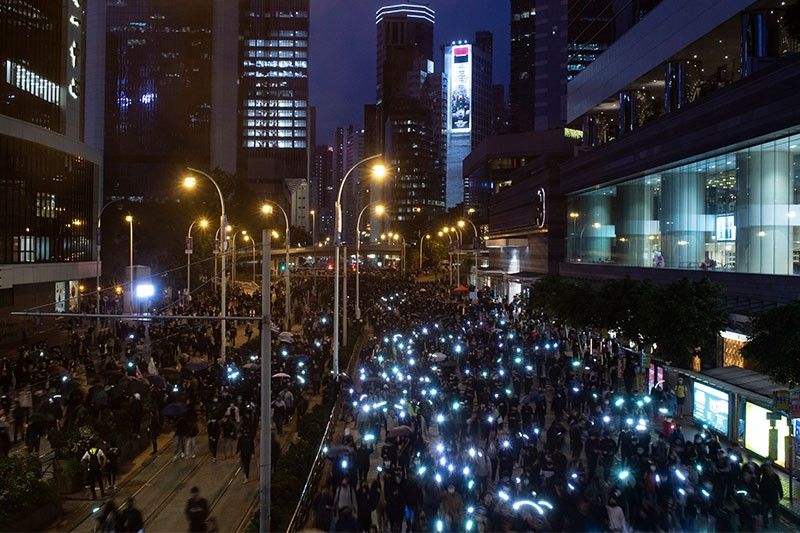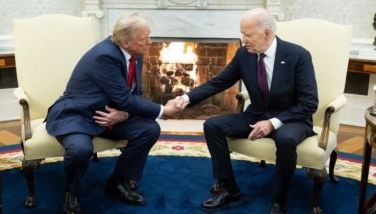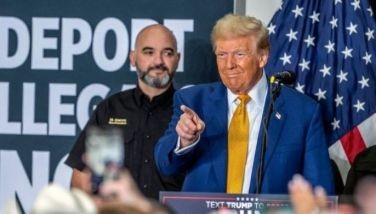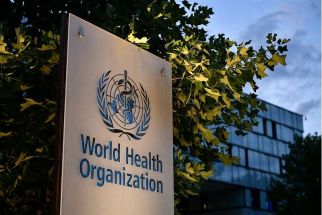Massive Hong Kong pro-democracy rally ends in police clashes

Organisers claimed more than a million people gathered for Wednesday's rally, which had approval from the authorities, and marched across the international financial hub's main island
But after a peaceful start, violence erupted near the march within hours, with police and masked protesters facing off in several neighbourhoods on the city's main island.
The Civil Human Rights Front, the umbrella group which organised the march, said authorities ordered them to end it after the clashes began.
"We believe the total turnout for today's march has surpassed the 1.03 million on June 9," the group announced, referring to the massive rally last year that kicked off the protest movement
The police gave a far lower estimate of 60,000, a number the CHRF said was "too ridiculous".
In now-familiar scenes, riot police used pepper spray, tear gas and water cannon, while hardcore protesters lobbed petrol bombs, built makeshift barricades and vandalised property belonging to businesses they consider pro-Beijing — including Starbucks and banking giant HSBC.
Police said
The Wednesday clashes were, however, small compared with
China and the Hong Kong administration have refused to
"It is sad that our demands from 2019 need to
Activists have accused the police of brutality and rights violations, while city authorities — and the central government in Beijing — have accused pro-democracy protesters of rioting.
China has also alleged that the unrest has
'Hopeless situation'
Hong Kong saw in the new year with an evening of peaceful protests that descended into tear gas-choked clashes between hardcore demonstrators and the police overnight.
The protest movement has become quieter since the city's pro-democracy camp scored a landslide victory in a municipal-level vote in November — seen as a referendum on the Beijing-backed government — and violent clashes at
But protesters have vowed to continue their fight for greater freedoms.
"
The unrest that began in June last year is the biggest crisis the former British colony has faced since its return to Chinese rule in 1997.
There have been at least two protest-linked deaths since the beginning of the unrest, and around 2,600 injuries.
Under the terms of the 1997 handover, Hong Kong enjoys unique freedoms unseen on the mainland, but fears have increased in recent years that they are being chipped away as Beijing exerts more control over the territory.
Millions march in Hong Kong in a powerful rebuke of an extradition law feared to expose them to China's capricious justice system.
Hong Kong national security police on Thursday detained four people, including the brother of prominent activist Dennis Kwok, one of eight fugitives with bounties on their heads for allegedly breaching national security.
The city's national security department "took in two men and two women from various districts in Hong Kong and Kowloon for investigation," a police source told AFP.
Among the four was the elder brother of former democracy lawmaker Dennis Kwok, who is currently in the United States.
"(Kwok's elder brother) is now under investigation in the Western District police station," the source said.
Three others, "two women and a man", were taken in Tuesday by the national security department, authorities told AFP earlier Thursday.
AFP has requested comment from police on the most recent detentions. — AFP
Three family members of exiled democracy activist Nathan Law have been taken in for questioning on Tuesday, days after authorities issued a bounty on him and seven others accused of breaching the city's national security law.
Police officers from the national security department brought in Law's parents and elder brother without formally arresting them, a police source confirmed to AFP.
"It's understood that officers from the NSD took three people -- Nathan Law's parents and elder brother -- in for questioning," they said.
"So far, no arrest has been made." — AFP
The United States condemns Hong Kong authorities for issuing bounties linked to democracy activists based abroad, saying the move sets a dangerous precedent that could threaten human rights.
Hong Kong police offered bounties of HK$1 million (about $127,600) for information leading to the capture of eight prominent dissidents who live abroad and are wanted for national security crimes.
"The United States condemns the Hong Kong Police Force's issuance of an international bounty" against the eight activists, State Department spokesperson Matthew Miller says in a statement.
"The extraterritorial application of the Beijing-imposed National Security Law is a dangerous precedent that threatens the human rights and fundamental freedoms of people all over the world," he adds, saying China is engaging in "transnational repression efforts."
"We call on the Hong Kong government to immediately withdraw this bounty, respect other countries' sovereignty, and stop the international assertion of the National Security Law imposed by Beijing." — AFP
Hong Kong's top court has quashed the conviction of a journalist in relation to her investigation into an attack on democracy supporters by government loyalists in 2019.
It was a rare victory for the press industry in a city where two major independent news outlets have been forced to shut down since Beijing imposed a national security law in 2020.
"Happy -- I could not think of another word that can describe my mood right now," veteran journalist Bao Choy said outside the Court of Final Appeal after the judgement was handed down.
"I think this kind of happiness belongs to everyone in society." — AFP
Hong Kong police detained Alexandra Wong, a prominent democracy activist better known as "Grandma Wong" on Sunday, the 34th anniversary of the Tiananmen Square crackdown, AFP reporters said.
Wong was carrying flowers in Hong Kong's Causeway Bay shopping district, an area that for years was the site of June 4, 1989, commemorations, before authorities escorted her to a police van. AFP reporters saw a total of six people bundled into police vehicles. — AFP
- Latest
- Trending































